Last year while developing our summer issue of NOTE magazine, we discovered that Paul Page was one of the first radio hosts for WAIV, the Indianapolis station that first broadcast Classical Music Indy (formerly the Fine Arts Society of Indianapolis). The 100th Running of the Indianapolis 500 in 2016 was Paul’s final year announcing the race before retiring. This article, that ran in NOTE in May 2016, is a tribute to his amazing life and legacy. Guest contributor, Jill Ditmire, talked to Paul about his life and what led him from classical music radio to the Indianapolis Motor Speedway and a broadcasting career spanning more than 46 years. Enjoy learning about Paul Page – the Voice of the Indy 500!
Paul Page: The Voice of the Indy 500
Jill Ditmire, Guest Contributor
Paul Page is not a quitter. Nothing could keep him from his passion: not advice to change his name (“the news director at WIBC said to me, your last name really needs to be two syllables if you want to play well”), or a tip to tone down his voice (“one of the news guys at WATI told me my voice just wouldn’t work for radio”); not even a helicopter crash could keep him from broadcasting motorsports. He will be ending his career as the Voice of the Indy 500 in May 2016 but Paul says he is the luckiest guy alive and that’s not a statement he takes lightly. He says he just never gave up on the passion for broadcasting he developed in high school.
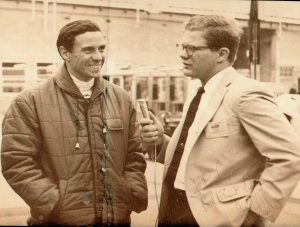
Paul Page interviewing Jimmy Clark, 1964
He was born Paul Hendsridge, not a name that just rolls off the tongue for a broadcaster. His parents divorced when he was quite young and his mother remarried an air force Colonel who adopted Paul and gave him his last name, Page. His step father’s military career got him involved with radio dispatch as part of the MARS- Military Auxiliary Radio System. “I was an early technology nerd,” says Page proudly. It was during his high school years in Waukegan, Illinois that Page experienced the dawning of rock and roll radio. When the airwaves went from mono to stereo sound, he knew where he wanted to be.
To feed that passion for broadcasting, he went to the University of Tulsa where he was forced to take a class that he says was another “twist of fate” that helped chart his career course. “The head of the department had cut an album in which he pronounced the names of all of the composers and difficult classical works and I had to listen to it as part of my coursework. So when I got to WAIV, and they handed me a list of classical composer names to pronounce, I was WAY ahead of the game. Again, luck. All coincidental luck,” Page recalls modestly. Maybe luck, but more likely talent landed him his first Indianapolis radio job at WAIV-FM Indianapolis, the original home of The Fine Arts Society of Indianapolis (now Classical Music Indy).
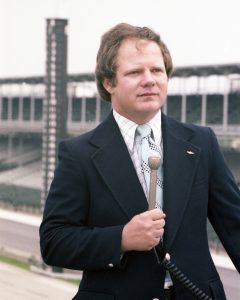
Paul Page, 1977
“[The station] was located on the top of the Dearborn Hotel on the near east side. We had a tiny studio, a small music library (all vinyls), we didn’t have anything on tape at that time and certainly not digital,” remembers Page. “The station came on the air at 1 in the afternoon and I was THE guy. I came on the air with a program called Opus Legato which was lighter classic until 8 in the evening, then I hosted a new show called Jazz Flight 805. It opened with a sound effect of a jet taking off, and I had to talk ‘low’ and play great jazz. Then two hours later we went back to heavier classic music till we signed off at 11 or midnight.”
“I went to the Indy 500 in 1960 and fell in love. So I thought maybe there was a way I could combine both radio and motorsports.” In 1970, Page got a job doing the news at WIBC where Sid Collins, the well-known voice of the Indy 500, was sports director. Collins soon became Page’s mentor and over time a very close friend. “I remember one time I was sent out as news reporter to cover the soap box derby. I interviewed the winner and was all pleased with the story and put it on the air. The next thing I knew Sid was standing there just shaking his head, basically saying it was the worst interview ever. He then launched into a 5 hour dissertation on how to conduct interviews,” says Page with an endearing laugh.
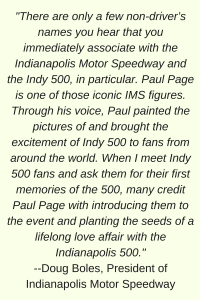 In 1973 Collins told Page that he could join the IMS Radio network as a pit reporter. “I had the garbage pits, the northern most section, where nothing really happened,” says Page. Until one year when his instincts took over and revealed his innate ability to bring live action to the listener. “Tom Sneva crashed and it was a spectacular flip. Dick Simon’s car got hit so he got out of the car so the crew could work on it and I took a chance and did a live interview. Sid came back to say that’s the first time we’ve ever interviewed a driver that was still in the race,” says Page.
In 1973 Collins told Page that he could join the IMS Radio network as a pit reporter. “I had the garbage pits, the northern most section, where nothing really happened,” says Page. Until one year when his instincts took over and revealed his innate ability to bring live action to the listener. “Tom Sneva crashed and it was a spectacular flip. Dick Simon’s car got hit so he got out of the car so the crew could work on it and I took a chance and did a live interview. Sid came back to say that’s the first time we’ve ever interviewed a driver that was still in the race,” says Page.
It wasn’t long before Page joined the IMS announcers in the booth. “When Sid passed away in 1977 the job became mine. He had told everybody that is what he wanted and he had thoroughly prepared me for that position.”
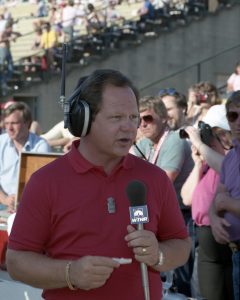
Paul Page, 1986
Page says, of his passion for racing, that Ernest Hemingway pegged it when he wrote that the only true sports are mountain climbing, bull fighting, and auto racing because they contain the very real elements of serious injury and death. Page had his own brush with death in 1977 while he was doing helicopter traffic reports for WIBC. “There really was no traffic in Indianapolis at that time. It was all fun until December 1, 1977. I’d anchored my first 500 that year and was doing TV work for Channel 13 and getting some calls from the networks. But that day in the chopper, at the end of our shift, the pilot and I heard a loud crack and looked at each other. The rotor had stopped. We were 500 feet in the air and falling into the football field at Speedway High School. I remember lying there on the ground just happy I was awake and that we crashed in front of one of the Speedway fire stations. They were there in minutes,” recalls Page. He says the experience gave him deeper appreciation for both his personal and professional life. “I became a lot more sensitive to things the drivers who had crashed were saying. It makes you care more and it made me do things I had been putting off. The drivers will tell you the same and it makes us all very close that way. “
That friendship with drivers is something that Page cherishes the most about his decades-long career.
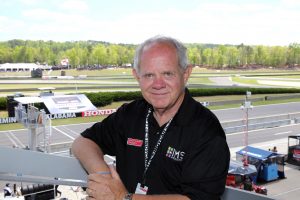
Paul Page, 2014
“I called AJ [Foyt]’s fourth win and that was so special. He pulled into the pit and there was the wreath and the trophy and the milk. He had this huge smile on his face and he took his gloves off and I swear he was looking right at me and he threw the gloves. I had forgotten that the queen and her court sat on the level just below me …I don’t think he was looking at me after all but it was a fun moment.” Those moments and others with what he calls his “racing family” will make May 29th of this year even more memorable.
“I wanted to do the 100th race. That is what I was looking forward to when they asked me to return. But we have to pass things on. They haven’t given me my exact assignment for the 100th but they have kindly asked me to return in future years as a kind of ‘Voice of the 500’ emeritus.” Page is writing a book about his years of experience and says he will enjoy being a fan in the stands. And if he could sit in the stands with ANYONE, who would he want his seatmates to be? In addition to a number of drivers, mechanics, and historians, Page said, “I’d like my mom there because she died before all of this. Just the person she was, it would have been wonderful if she would be there with me.”
To see this article in it’s original form in NOTE Magazine, you can go here. To listen to the interview with Paul Page and Jill Ditmire, listen below:

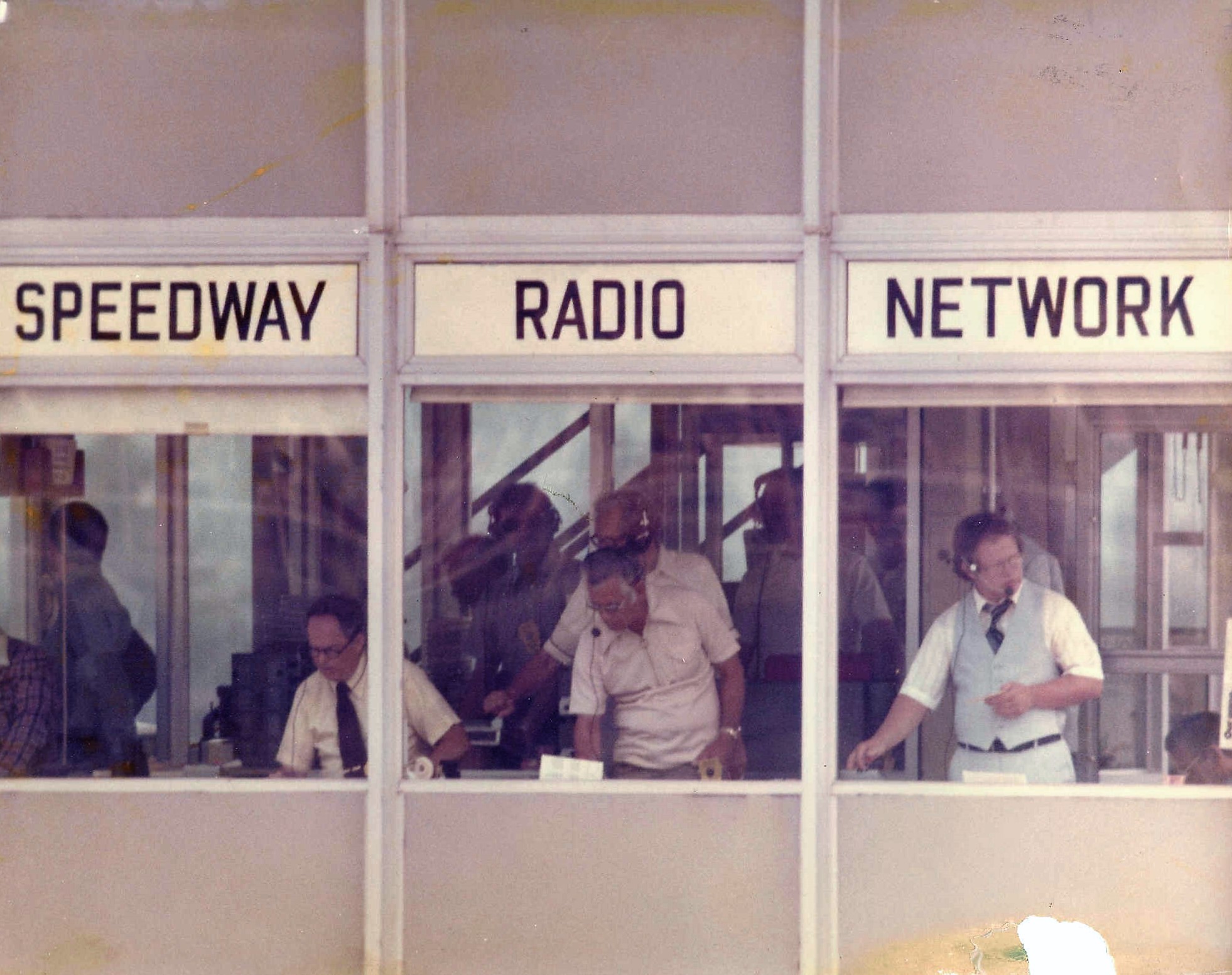





PAUL !! I always liked your INDY 500 broadcasts especially the one in 1982 with Johncock/Mears
really cool broadcast ! never forgot it! I wish you and your crew were still doing the TV broadcast of the INDY 500!! I still remember waking up the Sunday morning of the race hoping Gordy would win and you broadcast that day was really good !!!! Thanks /Good Health! Wayne Wachtell